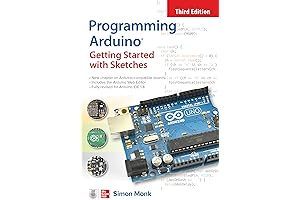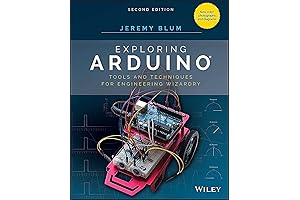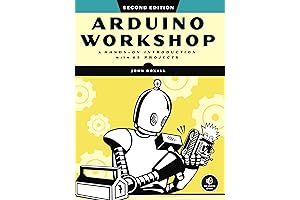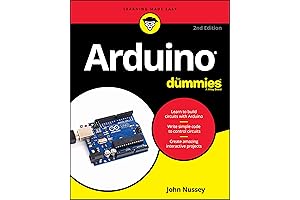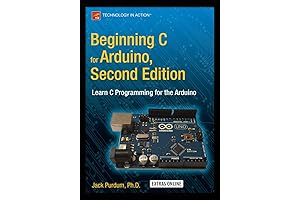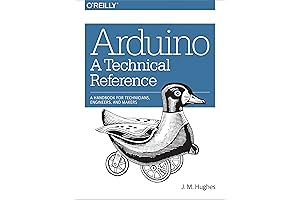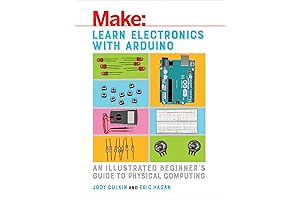· arduino · 12 min read
Best Arduino Books 2024: Explore, Learn, and Create with Confidence
Discover the best Arduino books for beginners and experienced enthusiasts alike. Learn about programming, hardware, and projects with our top picks.
Arduino books are essential resources for anyone interested in learning about electronics and programming. They offer a comprehensive guide to the Arduino platform, from its hardware and software to programming techniques and project ideas. Whether you're a complete beginner or an experienced Arduino user, our top picks will help you take your Arduino skills to the next level.
Overview

PROS
- Step-by-step instructions on how to program Arduino.
- Detailed explanations of Arduino concepts and components.
CONS
- May require some programming experience to fully understand.
- Limited coverage of advanced topics.
Programming Arduino: Getting Started with Sketches, Third Edition is a must-have for beginners looking to learn the basics of Arduino programming. It provides clear and concise instructions, avoiding jargon and ensuring accessibility to readers of all skill levels. The hands-on approach emphasising practical examples helps learners grasp concepts quickly.
While suitable for beginners, experienced users might find it lacking in advanced topics coverage. Additionally, some readers may need prior programming experience to fully capitalize on the material. Nevertheless, the book serves as a solid foundation for Arduino programming. The book's strengths lie in the accessibility it provides for beginners and its exploration of essential Arduino concepts.

PROS
- In-depth exploration of Arduino hardware and software fundamentals
- Practical insights into building and programming Arduino projects
CONS
- May be overly detailed for complete beginners
- Assumes some prior programming knowledge
Embark on an extraordinary journey into the world of Arduino with this comprehensive guide, 'Exploring Arduino.' This exceptional book unveils the secrets of Arduino's hardware and software, empowering you to transform your engineering visions into tangible creations. Through a captivating blend of theory and practical examples, you'll master the art of programming Arduino, unlocking a universe of possibilities.
With its meticulously crafted content, 'Exploring Arduino' caters to both aspiring and experienced tinkerers alike. Beginners will appreciate the gentle introduction to Arduino's fundamentals, while seasoned engineers will find valuable insights and techniques to refine their projects. The book's well-structured chapters and engaging writing style make learning a breeze, ensuring you absorb every nugget of knowledge with ease.

PROS
- Comprehensive guide tailored for beginners with zero prior knowledge
- Immersive hands-on projects empower self-paced learning and practical implementation
CONS
- May not provide advanced technical details for experienced users
Prepare to embark on an exciting journey into the world of electronics with 'Arduino Without Prior Knowledge'! This beginner-friendly guidebook is meticulously crafted to empower you with the foundational knowledge and practical skills to create your own Arduino projects from scratch—even if you have no prior technical experience.
The book's unique approach captivates you with a series of engaging, hands-on projects that are structured to unlock your potential as an engineer. Through these projects, you'll master the fundamentals of Arduino, electronics, and coding, gaining hands-on experience that solidifies your understanding. The author's expert guidance is evident throughout, providing clear explanations and troubleshooting tips.

PROS
- Immersive and hands-on approach with 65 engaging projects
- In-depth exploration of Arduino concepts and functionalities
CONS
- Some advanced concepts may require supplemental resources
- Project complexity may vary, suitable for a range of skill levels
Immerse yourself in the world of Arduino with the Arduino Workshop, 2nd Edition. This comprehensive guidebook provides a practical, hands-on approach, featuring 65 captivating projects that will take you from novice to proficient. Each project is meticulously crafted to introduce a specific Arduino concept or functionality, fostering a deep understanding of the platform's capabilities.
The book's strength lies in its project-based approach. By working through these hands-on exercises, you'll gain a practical understanding of Arduino's programming language, sensors, actuators, and interfacing techniques. The clear and concise explanations, coupled with visual aids and detailed schematics, ensure that even complex concepts are presented in an accessible and approachable manner.

PROS
- Comprehensive coverage of essential Arduino concepts and components.
- Step-by-step recipes guide users through beginner to advanced projects.
CONS
- Some recipes may require additional hardware or tools not included in the book.
- Assumes a basic understanding of electronics and programming.
The Arduino Cookbook is an invaluable guide for Arduino enthusiasts. It offers a collection of 60+ practical recipes that cover a wide range of projects, from basic beginner-friendly exercises to complex advanced applications. Each recipe is well-structured and includes detailed instructions, code snippets, and troubleshooting tips.
The book is a great resource for both beginners and experienced Arduino users. Its comprehensive coverage of Arduino concepts and components makes it an ideal starting point for those new to the platform, while the more advanced recipes provide valuable insights for seasoned makers. The use of step-by-step instructions ensures that readers can easily follow along and create successful projects.

PROS
- Provides a comprehensive overview of Arduino, its features, and its capabilities.
- Includes detailed tutorials and projects for beginners and experienced makers alike.
CONS
- Can be overwhelming for complete beginners.
- Some sections are outdated and may not reflect the latest versions of Arduino.
In this beginner-friendly guide, Getting Started with Arduino provides a comprehensive introduction to the world of Arduino, the open-source electronics prototyping platform. Through a blend of clear explanations, practical examples, and engaging projects, the book empowers readers to harness the versatility of Arduino and bring their creative ideas to life.
The book takes a step-by-step approach, guiding readers through the setup and configuration of Arduino, exploring its key features and capabilities. Along the way, it showcases a range of projects that illuminate the practical applications of Arduino, from simple blinking lights to complex sensors and actuators. Each project is carefully crafted to reinforce the concepts covered in the text, fostering a deeper understanding of Arduino's potential.

PROS
- Ideal for complete beginners with no prior coding or electronics knowledge
- Comprehensive coverage of Arduino basics, from setup to programming
- Step-by-step tutorials and hands-on projects to solidify learning
- Covers troubleshooting and debugging techniques for common issues
CONS
- May lack advanced concepts for experienced users
- Some projects require additional components not included in the book
Dive into the exciting world of electronics, coding, and robotics with the ultimate guide for beginners - Arduino For Dummies! This comprehensive book is your gateway to unlocking the potential of the Arduino platform, even if you have zero experience. With its easy-to-follow approach, you'll go from a complete novice to confidently creating and programming your own Arduino projects.
Arduino For Dummies takes you on a journey from the basics of Arduino, including setup and programming, to real-world projects that will ignite your imagination. Through step-by-step tutorials, you'll master essential concepts like digital and analog input/output, sensors, and actuators. Troubleshooting and debugging tips empower you to overcome common challenges and ensure your projects run smoothly.

PROS
- Master C programming for Arduino
- Effective techniques for Arduino programming
CONS
- May be too advanced for complete beginners
With its comprehensive coverage of C programming for Arduino, this guidebook empowers you to unlock the full potential of your Arduino device. Whether you're a seasoned programmer or just starting your journey, this book provides a practical, step-by-step approach. The second edition boasts updated content tailored to the latest Arduino versions, ensuring you stay up-to-date with the ever-evolving world of Arduino. Immerse yourself in the intricacies of C programming and push your Arduino projects to new heights.
Through engaging examples and hands-on exercises, this book demystifies the fundamentals of C programming, making it accessible to readers of all levels. You'll delve into essential concepts like data types, variables, functions, and control structures, mastering the building blocks of C programming. As you progress, you'll discover how to effectively interface with hardware components, empowering you to create interactive projects that interact with the real world. Rest assured that your understanding is reinforced through real-world examples, so you can apply your knowledge with ease and confidence.

PROS
- Provides a comprehensive overview of Arduino hardware and software fundamentals, catering to the needs of both novices and seasoned professionals.
- Features detailed technical insights and practical examples, empowering readers to master the intricacies of Arduino programming and applications.
CONS
- Some sections assume prior knowledge of electronics, which may pose challenges for absolute beginners.
- Despite being a reference book, it lacks an index, making it slightly inconvenient to navigate specific topics quickly.
Prepare to dive into the world of Arduino with this comprehensive technical reference guide, meticulously crafted by Arduino experts. Whether you're a seasoned engineer or just starting your Arduino journey, this book is your go-to resource for mastering the ins and outs of this remarkable platform.
Arduino: A Technical Reference stands out with its exhaustive coverage of both the software and hardware aspects of Arduino. From the fundamental concepts of microcontrollers to the intricacies of coding and programming, this book leaves no stone unturned. The authors skillfully blend theory with practical application, empowering you to not only understand the 'how' but also the 'why' behind Arduino's functionality.

PROS
- Comprehensive coverage of essential electronics concepts, catering to absolute beginners.
- Step-by-step instructions and practical projects reinforce learning, fostering hands-on experience.
CONS
- Projects may require additional components, potentially requiring external sourcing.
- Advanced topics might be better suited for more experienced readers.
Embark on the exciting journey of electronics with 'Learn Electronics with Arduino,' a beginner-friendly guide that demystifies this captivating field. This book empowers aspiring makers with a thorough grounding in fundamental concepts, guiding them through practical projects that solidify their understanding. Each project is meticulously explained, with clear instructions and vivid illustrations that make learning interactive and enjoyable.
While the focus on essential concepts is commendable, the book's strength lies in its hands-on approach. The included projects not only reinforce theoretical knowledge but also provide a tangible sense of accomplishment. However, it's worth noting that these projects may necessitate additional components, which might require external procurement. Additionally, while the book provides a solid foundation, those seeking more advanced topics may need to explore supplementary resources. Overall, 'Learn Electronics with Arduino' is an invaluable companion for anyone eager to dive into the world of electronics and physical computing.
Our selection includes books that cover a wide range of topics, from basic programming concepts to advanced hardware projects. We've included books for all skill levels, from beginners who are just starting out to experienced users who want to expand their knowledge. With our recommendations, you'll find the best Arduino book to help you achieve your goals.
Frequently Asked Questions
What are the best Arduino books for beginners?
For beginners, we recommend "Getting Started with Arduino" by Massimo Banzi and Michael Shiloh. This book provides a comprehensive introduction to the Arduino platform, covering everything from hardware setup to programming basics.
What are the best Arduino books for advanced users?
For experienced users, we recommend "Arduino: A Technical Reference" by Peter Danieley. This book provides an in-depth look at the Arduino hardware and software, including advanced topics such as interrupts and interfacing with external devices.
What are the best Arduino books for projects?
For project inspiration, we recommend "Arduino Workshop" by John Boxall. This book includes 65 hands-on projects that teach you how to use Arduino to build a wide range of projects, from simple LED circuits to complex robotics.
What are the best Arduino books for learning C?
To learn C programming for Arduino, we recommend "Beginning C for Arduino" by Jack Purdum. This book provides a step-by-step guide to C programming, with a focus on practical examples and projects.
What are the best Arduino books for learning electronics?
To learn about electronics fundamentals, we recommend "Learn Electronics with Arduino" by John Becker. This book provides an illustrated guide to basic electronics concepts, with hands-on projects that demonstrate how to use Arduino to interact with electronic components.
